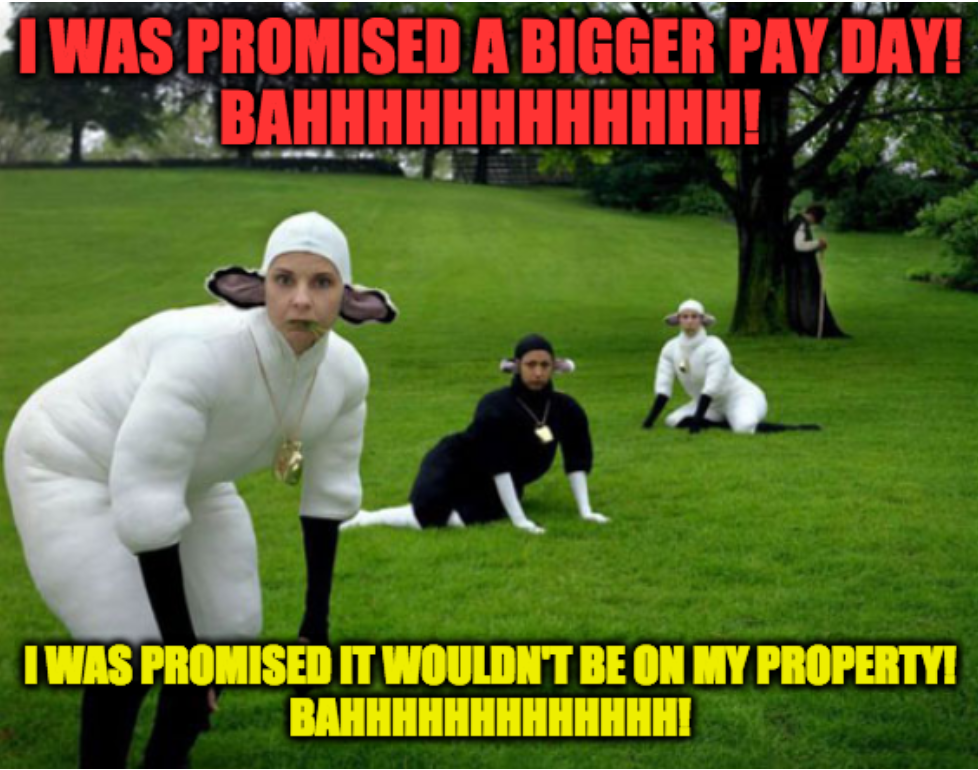...the permit holder has made good faith efforts to engage with landowners and other stakeholders early in the applicable permitting process...
I've asked in several places... what good is "early engagement"? It just gives the developer more time to tick off landowners and more time for landowners to educate themselves and put together opposition.
However, this article finally lays their scheme bare. The purpose of "early engagement" is to find out which wheels squeak and to apply enough oil so that a squeaky wheel keeps quiet until it no longer has any rights.
The article goes on about “Powerline: The First Battle of America’s Energy War,” which is a seminal work about an epic transmission opposition battle that was waged in Minnesota in the 1970's and 80's. It is also a "must read" book that is passed among transmission opponents. The message opponents have taken from the book, however, is much different. The book teaches that transmission developers and their government flunkies create various time wasting processes for opponents to participate in. It's the same thing as giving a crying child a lollipop. Just a distraction so they stop behavior you don't want them to engage in... like actually stopping your transmission project. If opponents are focused on various make-work tasks or achieving promised scenarios that are dangled like carrots on sticks, they aren't forming opposition and they aren't gumming up your regulatory approvals. If you tell landowners that maybe you can move the project off their property if they do what you direct, how many landowners will comply because they simply have no other hope? Is separating the sheep from the herd and neutralizing them really that easy? Apparently they all think so.
Taking the time today to listen to property owners and adjust plans in response to their concerns, they hope, will lessen the likelihood of drawn-out legal or political battles delaying the project later.
Christina Hayes, executive director of Americans for a Clean Energy Grid, said the two Minnesota utilities are following the best practice of early stakeholder engagement to avoid later potential litigation.
The third powerline was the last straw for Marla Britton. Her and her husband’s 40-acre farm near Brainerd, Minnesota, is already framed by electrical wires on the east and south. When she learned of plans for a new project running along the north end of her property, she took action. Britton wrote to state utility regulators and contacted the companies behind the planned Northland Reliability Project. The 180-mile line will eventually make it easier to move clean electricity between central and northern Minnesota. Soon, a utility representative was at her doorstep to discuss her concerns and ideas for rerouting the line where it would have less impact on her and her neighbors.
“They listened to me and wrote down what I said,” Britton said. “They agreed it was way too much for my property.”
It’s yet to be seen how Britton’s feedback will be reflected in the final route, but the interaction illustrates the type of engagement that project backers say they are aiming for with the project. Taking the time today to listen to property owners and adjust plans in response to their concerns, they hope, will lessen the likelihood of drawn-out legal or political battles delaying the project later.
It looks like this is the apparent aim of "early engagement." Separate the irate landowners from the herd so they don't organize. Once isolated, promise them whatever you need to promise to make them behave. If you promise to route it off their property perhaps they won't cause trouble, believing they are getting "special" treatment that their neighbors are not. Maybe the transmission developer promises a bigger pay out if you keep quiet. Whatever it is, don't expect that the transmission developer will actually keep its promise after the deadline to intervene in the permitting process expires. Once there is no longer anything you can do to hurt them except whine that you didn't get the special treatment you were promised (but never in writing), you may be cut adrift, tossed away like so much trash. Then the transmission company is free to proceed with its plan and there's nothing you can do to stop them.
Don't let this happen to you.

 RSS Feed
RSS Feed